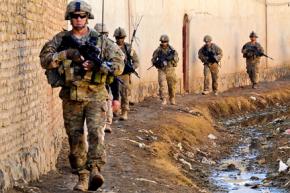Mission abandoned
The U.S. and British governments have failed to accomplish their central war aims in Afghanistan, explains Belfast Telegraph columnist .
BRITISH TROOPS can leave Afghanistan and come home with their heads held high: "Mission accomplished," David Cameron told them in mid-December. Many will have wondered: what mission was that?
Back in 2001, Tony Blair gave two reasons for sending British soldiers to the other side of the world. First, to back up George W. Bush in crushing the Taliban once and for all. And second, to eradicate the production of poppies. Drawing the two issues together, Blair declared: "The arms the Taliban are buying today are paid for by the lives of young British people buying their drugs on British streets. This is another aspect of the regime which we should seek to destroy."
Today, the Taliban are as strong as at any point since they were ousted from Kabul in November 2001. The main perspective now of the U.S. and the Afghan government of Hamid Karzai is to try to identify Taliban leaders with whom they might negotiate a settlement. Nothing accomplished on that front, then.
Meanwhile, last year was a bumper poppy harvest. September alone yielded 6,060 tons--more than the combined production of the rest of the world, according to the UN Office on Drugs and Crime (UNODC). A plan introduced in 2010 to cut down production by paying farmers not to plant poppies backfired when thousands of farmers who had never grown poppies began sowing the plants so as to be paid to stop.

Since then, cultivation has been spreading to new parts of the country. This year, according to the UNODC, Afghans have planted poppies in 516,450 acres across 17 provinces, up from last year's 380,540 acres in 15 provinces.
In the meantime, 446 British soldiers have met their deaths--a higher figure than in Iraq or the Falklands--most commonly from improvised explosive devices buried along the dusty roads of Helmand province. They have been killed at four times the rate of U.S. troops, a statistical disparity which nobody at Westminster seems anxious to explain.
A snapshot of non-lethal casualties showed that between April 2012 and March 2013, 29 British soldiers had limbs amputated. Twelve of these were classified as "significant multiple amputees." The average age of those who died was 22. Thirty-one were teenagers, 200 in their 20s. Of the Afghan veterans who had made it home more or less in one piece, the most common cause of death in 2012 was suicide.
ONE REASON for the relatively high British casualty rate--in the absence of evidence, this can only be speculative--could be the ignorance and stupidity of British politicians and their carelessness about the lives of the young people they were sending into battle, the resultant failure to provide basic equipment and the deployment of personnel in ways which made no military (or any other sort of) sense.
The role of the politicians was best summed up by Defense Minister John Reid in April 2006, as British soldiers prepared to move into Helmand. He travelled out, press entourage in tow, to explain that their task was not to fight--unless attacked themselves--but to provide protection for local people repairing damage to homes and schools. "We would be perfectly happy to leave in three years' time without firing one shot," he told journalists.
The intelligence, in any sense of the word, was non-existent. Small wonder, then, that the soldiers found themselves travelling in soft-skinned vehicles through some of the most dangerous terrain on earth, under constant attack from armed groups.
A measure of how little has actually been accomplished in Afghanistan can be extracted from current discussions between British Prime Minister David Cameron's selfie sidekick Barack Obama and Karzai about the terms on which the U.S. might maintain a military presence in the country until 2024.
It is reported that Karzai, a spectacularly corrupt leader, the writ of whose government doesn't reach the suburbs of his capital, is reluctant to accept immunity from all Afghan laws for U.S. troops and mercenaries ("contractors").
He wants the U.S. to try harder not to kill Afghan civilians and to stop kicking in their doors at night. He wants a greater role for Afghan officials in probing such incidents. He wants--get this--an assurance that the U.S. will not intervene to determine the outcome--"sabotage" is Karzai's word--of elections set for April. This is what so many have given their lives for? What a waste.
And what a waste of space the politicians are who brought it about and who now tell us it's all been worthwhile.
First published at the Belfast Telegraph.


